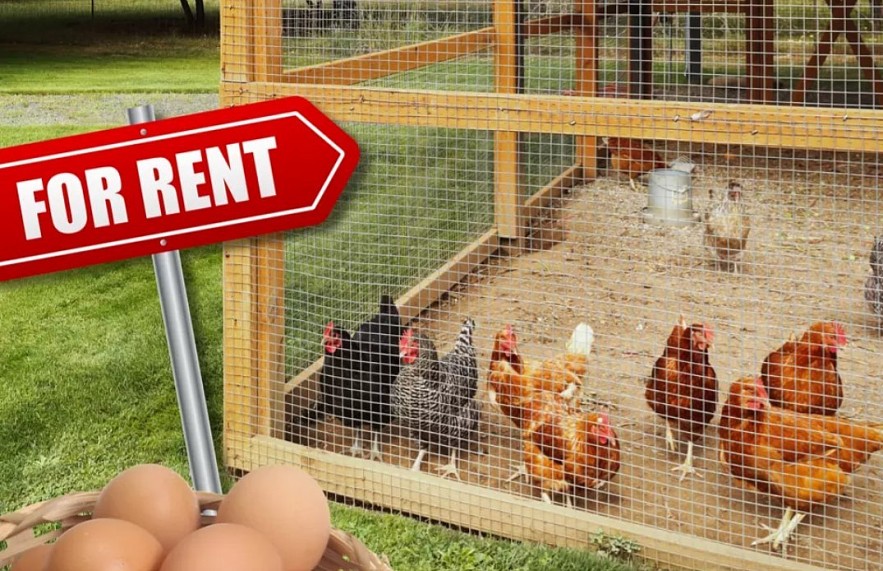What is 'Rent-a-Chicken' Trend in the US? And How Does It Work?
 Egg Prices Drop Sharply in the U.S.: What Consumers Can Expect Next Egg Prices Drop Sharply in the U.S.: What Consumers Can Expect Next |
Why Americans Are Renting Chickens — Yes, Really
In recent years, the U.S. has seen a growing interest in urban farming. But in 2024–2025, one quirky trend is taking center stage: Rent-a-Hen. As egg prices hit record highs—driven by inflation, bird flu outbreaks, and supply chain issues—more Americans are skipping grocery stores and turning their backyards into mini farms. But instead of buying chickens outright, many are choosing to rent egg-laying hens.
The concept? Simple: Fresh eggs at your doorstep, no farming experience required.
 |
| What Is 'Rent-a-Hen' Trend in the US |
What Is 'Rent-a-Hen'?
'Rent-a-Hen' is a short-term chicken rental service that provides customers with:
-
2 to 4 live hens
-
A portable coop (often on wheels)
-
Feed, water containers, bedding
-
Instructions for care
-
Delivery and pickup service
It’s like Airbnb, but for chickens. This service is designed for beginners or families curious about keeping hens without the full-time responsibility or permanent commitment.
Why Is This Trend Booming Now?
1. Egg Prices Have Skyrocketed
According to the USDA, egg prices rose over 60% year-on-year, with some areas reporting prices as high as $10–14 per dozen. Causes include:
-
Ongoing inflation
-
Bird flu epidemics leading to mass culling
-
Disrupted supply chains post-COVID
-
High feed and transportation costs
For many, paying nearly a dollar per egg was the tipping point.
2. Backyard Sustainability Is Hot
Post-pandemic, millions of Americans reassessed their food sources. Fresh, local, and sustainable became more than buzzwords—they became personal goals. Renting hens offers a way to live more sustainably without fully committing to farm life.
3. Low-Commitment Farming
Buying chickens requires permanent coops, veterinary care, and long-term effort. 'Rent-a-Hen' lets you try before you buy. If it’s not for you, no problem—return the hens at the end of the rental term.
How Does 'Rent-a-Hen' Work?
What’s in the Package?
A standard six-month rental (from companies like Rent The Chicken) typically includes:
-
2 hens (laying approx. 10–14 eggs/week)
-
A fully enclosed mobile chicken coop with a nesting box
-
100–150 lbs of organic chicken feed
-
Setup instructions and 24/7 customer support
-
Return pickup at end of term
Many packages also offer the option to adopt the hens if the experience goes well.
How Much Does It Cost?
Prices vary by location, provider, and package. Here’s a rough breakdown:
| Package | Duration | Hens | Approx. Cost |
|---|---|---|---|
| Starter | 4–6 months | 2 hens | $500–$600 |
| Deluxe | 6 months | 4 hens | $750–$900 |
| Add-ons | Extra feed, winterization, egg-collection training | Varies |
The cost may seem high upfront, but compared to spending $10/dozen eggs for six months, many families find the value worthwhile—especially with the added benefits of education and fresh food.
Who’s Renting Chickens?
Real Stories:
-
Yong-mi Kim, a California resident, rented two hens to test backyard chicken life. “I really want to try it out and see whether I like it or not,” she told AFP.
-
Victoria Lee, a Rent The Chicken franchisee in Agua Dulce, CA, said demand has tripled since last year.
-
Parents with children, health-conscious consumers, and eco-friendly households are among the biggest demographics embracing the trend.
Benefits of Renting Hens
Fresh, Local Eggs
Two hens can provide 10–14 eggs a week, free from preservatives and shipping delays.
Educational for Kids
Families see this as a hands-on learning experience about food, responsibility, and animals.
No Long-Term Commitment
Don’t want chickens in winter? No problem. Rentals are seasonal, and hens are picked up at the end.
Sustainable Living
Raising chickens reduces carbon footprints, food waste (they eat scraps!), and dependency on industrial agriculture.
What to Consider Before Renting
-
Zoning laws: Check if your city or HOA allows backyard chickens.
-
Noise and smell: Hens are quieter than roosters but still need regular cleaning.
-
Predator safety: Ensure coops are secure from raccoons, hawks, etc.
-
Commitment: Even with support, hens need daily care and feeding.
Who Offers Chicken Rentals in the US?
Top Providers:
-
Rent The Chicken (nationwide across 40+ states)
-
HENtastic Rentals (California & Texas)
-
Cluckingham Palace Rentals (Midwest-based)
-
Backyard Chicken Co. (Northeast)
Most providers offer delivery, setup, and 24/7 customer support—no farming knowledge needed.
Final Thoughts: Fad or Future?
What started as a quirky solution to "eggflation" has become a broader movement toward self-sufficiency. For many Americans, renting chickens is no longer just about saving money—it's about taking control of their food, lifestyle, and health.
Whether it’s for your wallet, your well-being, or your weekend project, ‘Rent-a-Hen’ is here to stay—and it’s changing how Americans connect to their food one egg at a time.
FAQs
Q: Can I keep the chickens after renting?
A: Yes! Many services let you adopt the hens at the end of the rental period.
Q: How many eggs will I get per week?
A: On average, two hens lay 10–14 eggs weekly.
Q: Is it cheaper than store-bought eggs?
A: Not always, but the value comes in freshness, learning, and sustainability.
 Why Should You Avoid Storing Eggs in the Refrigerator Door? Why Should You Avoid Storing Eggs in the Refrigerator Door? Although experts advise against putting eggs in the refrigerator door, eggs are better kept in the refrigerator than at room temperature. |
 How Much Is A Dozen and A Half Dozen - Definition, Origins and Facts How Much Is A Dozen and A Half Dozen - Definition, Origins and Facts In everyday language, the terms "a dozen" and "a half dozen" are frequently used to describe quantities, particularly when shopping or cooking. So how much ... |
 Egg Prices Drop Sharply in the U.S.: What Consumers Can Expect Next Egg Prices Drop Sharply in the U.S.: What Consumers Can Expect Next The cost of wholesale eggs in the United States has fallen by 9%, according to the latest data from the U.S. Department of Agriculture (USDA). |
 Can You Eat Dyed Easter Eggs? The Ultimate Guide to Safety, Storage, and Smart Tips Can You Eat Dyed Easter Eggs? The Ultimate Guide to Safety, Storage, and Smart Tips Can you eat dyed Easter eggs? Discover when dyed eggs are safe, which dyes to use, how long they last, and top food safety tips ... |























